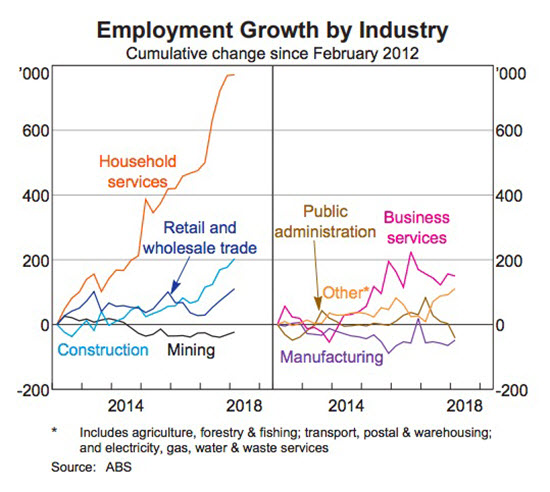
BUDDY COP MOVIES FROM HELL
Neoliberalism and nationalism are, ostensibly, incompatible. The belief in open borders and the ability of labour and investment to flow wherever the market can make best use of them directly contradicts nationalist sentiment that values border control and one’s own tribe above all others. So what happens when a neoliberal party and a right-wing populist party form a government? Austria’s neoliberal OVP and the near-fascist FPO are finding out and it’s not pretty. And speaking of strange bedfellows, the hard left in Europe is finding common cause with the far right when it comes to Russia.
WORKING HARD OR HARDLY WORKING?
Do you have a bullshit job? It was Douglas Adams who first identified that a huge chunk of service industry jobs literally had no purpose and could simply be scrapped (or their workers dispatched in a giant space ark) without any noticeable impact on society. David Graeber has explored the issue in more detail, starting with his famous 2013 article, and it turns out many workers think Adams had a point — they work in jobs that could vanish without anyone noticing.
Which brings us to our Stat of the Week from the Reserve Bank’s latest chart pack. It sums up better than any other graph I’ve seen how Australia is becoming a service economy; look at how rapidly household services have grown as a source of employment since 2012. The only “making things” job with any appreciable growth has been construction.

And even if we all suddenly became healthy and stopped ageing, that wouldn’t halt the rise and rise of service jobs, according to new Australian research. Accountancy courses, anyone?
#INTERNETOFSHIT
Lots of positive responses (well, negative responses, but in a good way) to last week’s links on the #IoS. I’ll keep up the stories about needlessly-connected homewares gifting priceless opportunities to hackers, but meanwhile, we’re utterly stuffed anyway due to the looming arrival of quantum computing. Quantum computing has been talked about for maybe 15 years that I can recall, but it’s now nearly within reach as a commercially available tech, which means normal encryption will be useless in a few years’ time. Then again it’s not like our government, corporations or NGOs can protect our data now. But can’t we use BLOCKCHAIN?!!! Well, alas…
GAMECHANGER! BLOCKCHAIN’S ACTUALLY RUBBISH
Sick of the hype about blockchain and cryptocurrencies? Tired of endless stories about what a “gamechanger” blockchain is? FT Alphaville’s got your back. The long-time blockchain sceptics report from a recent House of Commons hearing where even blockchain evangelists admitted major problems with it.
REPORTING LIVE FROM A NIGHTMARE
One the most Sisyphean tasks in US journalism must be to write another take on another school massacre. The Atlantic‘s David Frum understandably offers no profound insights about the latest one in Texas, but he has an excellent catalogue of statistics and suggests that a moral movement against gun lunacy comparable to religious awakenings might be underway. Meanwhile over at Harper’s, Seymour Hersh has given a fascinating account of how he broke the My Lai massacre story in 1969 (the massacre occurred just over 50 years ago, in March 1968).
TWILIGHT’S LAST GLEAMING
And if you’re not depressed enough about how bleak life can be in the US, here’s a map of US “abortion deserts” — areas where women have to travel more than 100 miles to access reproductive health services.

Meanwhile, why did Donald Trump make such a spectacle of welcoming home three American hostages who had been held by North Korea? For domestic political gain, of course (Nixon did the same with POWs). Only problem is, did Trump thus accidentally signal how valuable future US captives might be for countries looking to get something from him?
AND FINALLY…
Nayuka Gorrie both challenges white and heterosexual definitions of family and reflects on the anti-marriage equality campaign from an Aboriginal, as well as queer, perspective, in this wonderful piece.








Thank you for the services graph, Bernard — really interesting. Assorted summary comments follow.
IoT
You’ll get no arguments from me about overconnected peripheral IoT consumer devices offering needless costs and risks but no added value. However, I wouldn’t dismiss the underlying technology. It’s amazingly useful for niche purposes, like farming, meteorology, traffic management, citizen science, home security, health monitoring and other remote information/control intensive work where the cost of colocated human involvement limits what you can know and how fast you can respond.
Blockchain
There are definitely issues around blockchain, and whether the technology is overhyped (it probably is) speculation in blockchain at least certainly is. (By way of disclosure, I have a PhD in IT, excelled at encryption as an undergrad, and have been consulting on informatics for the last 20 years, yet I still can’t see a scaleable business case for widespread blockchain use.) However, I think the long-term potential of the technology is too soon to call. I can at least see certain niche uses like commodities contracts, working well. I don’t myself want to see a widespread currency built from it yet though. The costs and risks of running it seem insane.
Encryption and Quantum Computing
If you’re suddenly worried about encryption, you shouldn’t be: you should have always worried about encryption.
Encryption is an arms-and-armour race by design and there’s nothing we can do about it. By way of example, a bottom of the line smartphone today is about a million times more powerful than The Bombe — the machine Alan Turing made in 1939 to crack the German WWII Enigma code.
Tied mainly to our ability to microminiaturise transistors, the constant improvement of computing power has put pressure on encryption since the 1950s. While it was always expected that the rate of transistor miniaturisation would eventually taper off to theoretical limits, the wave of quantum computing and potentially other emerging technologies is likely to boost it yet again. The answer isn’t to abandon encryption — we literally can’t. It’s to plan for the obsolescence of specific encryption methods, and recognise that like a door-lock, its a deterrent, not absolute security, and plan accordingly.
Hardly working
People pay premiums for branding, and branding is nothing more than a psychosocial experience. They’ve always paid to have people around them making them feel important, powerful and privileged, and it seems to me that a lot of what you’ve called ‘bullshit jobs’ are doing precisely that.
The concern to me isn’t that they exist — humans have always paid for flattery. It’s the price set on them, in comparison to the price set on jobs that actually increase social and intellectual capital.
The ratios seem wrong. I don’t fully understand why, but it seems lethally dangerous to me.
Sideline
Obviously, no reader will always agree with the selection of topics or how you’ve curated them, but I love the concept and what it’s adding to what I feel is increasingly becoming Crikey’s key differentiator: smart topics, illuminated constructively.
Great work, thank you.
BS jobs may be BS but they are really a social service aren’t they?
Unemployment, and no money, is worse.